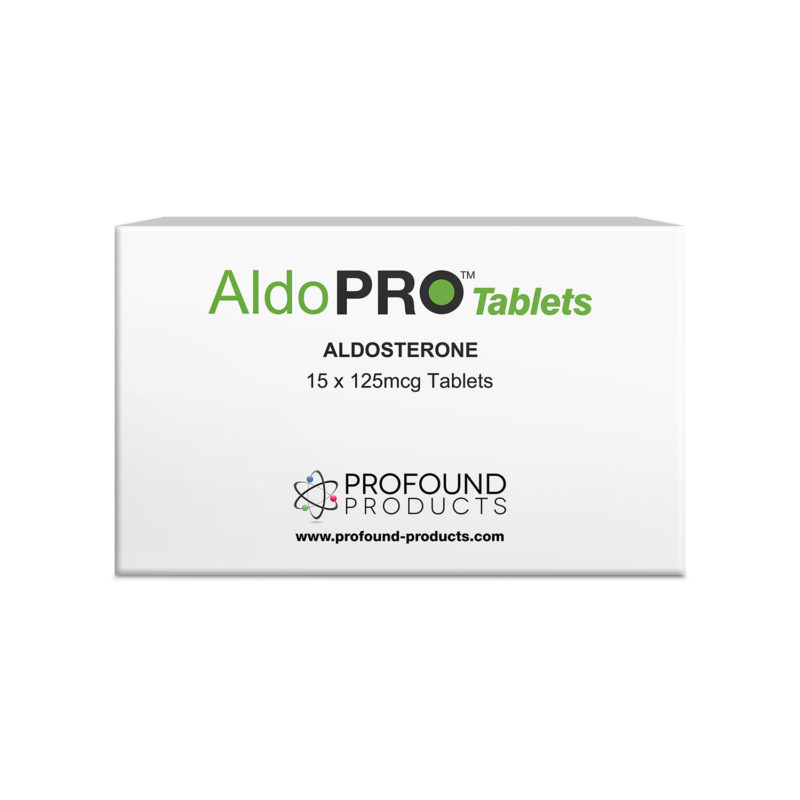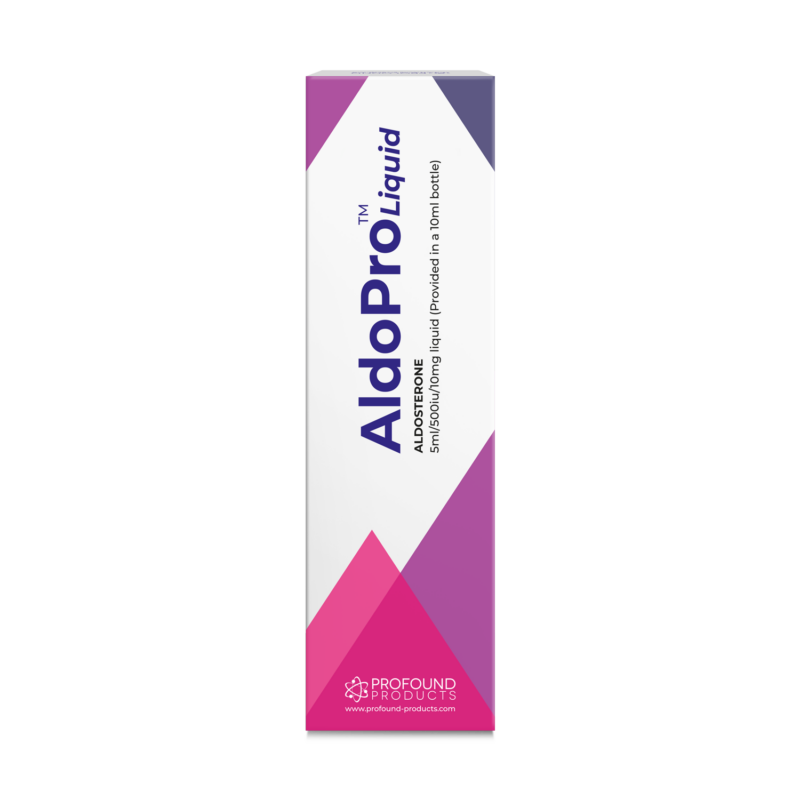
AldoPro™ 125mcg Tablets (Aldosterone)
Maintains the delicate balance of essential salts & water to aid balance and hearing
Aldosterone is a hormone that may also hold the key to loss of hearing. It plays an important role in blood pressure health through the way it helps to maintain the water and essential salts balance in the body.
Aldosterone has also been seen as a treatment for hearing loss, offering a viable alternative to hearing aids and related surgery.
Available in boxes of 15 x 125mcg tablets.
This product features in the
following categories
This product has the
following ingredients
This product is associated with the following health conditions
Addison’s disease Adrenal Fatigue Cortisol Alteration Hearing disorders Low Estrogen Levels Requiring HRT MenopauseProduct Description
Aldosterone: the natural treatment for hearing loss and regulating blood pressure
The hormone Aldosterone has long been known to play a vital role in the regulation of essential salts and water in the body, which is crucial for regulating blood pressure. In addition, more recent research has shown that Aldosterone secretion may be key in how well we can hear and related hearing loss.
Essential salts & water play a key role in how well we can hear
Due to Aldosterone’s role in keeping the body’s sodium (salt), potassium and water levels in equilibrium, it also plays a key role in hearing and hearing loss. These essential salts and water are also known as the body’s electrolytes and have been linked with hearing loss. The inner ear is particularly sensitive to Aldosterone levels. Low levels may result in sensorineural deafness, which occurs from damage to the inner ear.
Aldosterone levels also play a part in the function of the antidiuretic hormone (adh for short), which regulates the uptake and use of water by the body. The levels of adh and Aldosterone are therefore inextricably linked: part of the delicate balance of salt and water in humans.
Aldosterone deficiency and hearing loss
The work of Dr Jonathan Wright in the US has been particularly key in the area of alternatives to surgery and hearing aids when treating hearing loss. The so called “Aldosterone factor” has been researched
Dr Jonathan Wright took an active interest in Aldosterone following 2005 research into what causes hearing loss in older people by the International Center for Hearing and Speech Research (ICHSR). Further information on this study can be found here: https://www.sciencedaily.com/releases/2006/02/060212182434.htm but in summary, this study comprised of a study of older men and women between 58 and 84 which showed that hearing improved in relation to the amount of Aldosterone in the body, and people with acute loss of hearing had just half the Aldosterone blood levels as those with normal hearing.
From this research, which demonstrated a direct link between loss of hearing and low blood levels of Aldosterone, Dr Jonathan Wright established an Aldosterone hearing loss treatment regime at his clinic. Dr Thierry Hertoghe also carried out Aldosterone hearing loss work in Belgium.
The ongoing movement to address Aldosterone deficiency in age related hearing loss represents a real advance in treatment options that are far less intrusive than surgery or hearing aids.
What causes hearing loss?
There are a number of causes of hearing loss, the aging process being just one of them. Conditions like sensorineural hearing loss and tinnitus can cause problems at any age, including hearing loss in children. Although rare, hearing loss in childhood has been related to the Hyperaldosteronism condition and over-production of aldosterone (more on this below). Whatever the cause, the symptoms of hearing loss range from mild to acute.
Increasing knowledge and study into Aldosterone brings hope for a variety of hearing problems, including AIED (autoimmune inner ear disease) and Meniere’s disease. Taking an Aldosterone supplement every day alongside other supplements and/or sensible precautions to keep our hearing safe (such as not listening to very loud music), Aldosterone is by far one of the simplest and safest regimes to follow.
Hyperaldosteronism
Hyperaldosteronism is a medical condition that is underlined by Aldosterone balance in the body. It presents with high blood pressure, water retention and fatigue and is caused by excessive Aldosterone levels, which in turn lowers the levels of potassium in the blood (a condition known as hypokalaemia). If left untreated, it can result in heart disease or kidney damage.
Hyperaldosteronism presents with 2 types – Primary (Conn’s Syndrome) and Secondary.
- Primary Hyperaldosteronism: This occurs when the adrenal glands themselves produce too much aldosterone, often due to an adrenal tumor or adrenal hyperplasia (enlargement of the glands). It’s the most common cause of secondary hypertension, which is high blood pressure due to an underlying condition.
- Secondary Hyperaldosteronism: This results from external factors that increase aldosterone production, such as kidney problems or conditions that reduce blood flow to the kidneys, like heart failure or liver disease.
Dosing with Aldosterone
A typical dosage is one Aldosterone capsule 1 or 2 times daily.
Considerations should be taken if dosing with Aldosterone tablets. It should not be taken alongside certain supplements without medical advice, including magnesium, calcium, Vitamin D, potassium and sodium.
Aldosterone FAQ
Disclaimer: Please note that only your own physician can determine your precise needs, but in order to give you some information these answers are based upon the ‘average person’ and clinical / published results.
Do tablets work as well as sublingual supplements or transdermal options? Will they be digested or absorbed properly?
Whilst this can be the case with other hormones, it is not so with Aldosterone. Dr Wright used Aldosterone orally in his research.
Are there any warnings about Aldosterone?
For most people Aldosterone therapy is well tolerated and should not pose problems. Caution is recommended if a person has a tendency to swell easily in the hands, ankles and / or feet or who suffers from high blood pressure (hypertension). Patients who swell easily or who have high blood pressure should not take Aldosterone at all or, if they do, they should start on very low doses and then after ten days cautiously increase their daily dose if no contraindications appear.
- Tadros SF, Frisina ST, Mapes F, Frisina DR, Frisina RD. Higher serum Aldosterone correlates with lower hearing thresholds: A possible protective hormone against presbycusis. Hear Res. 2005 Nov;209(1-2): 10-8
- Wright J. Nutrition & Healing Take charge of your hearing loss before it is too late. Vol 13, Issue 4 May 2006



